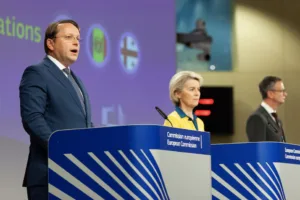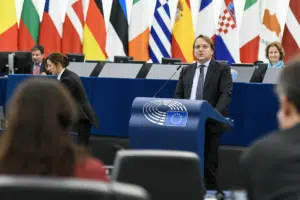Brussels – Today (July 29), the Hungarian government added Olivér Várhelyi to the list of commissioner candidates for the new College still headed by Ursula von der Leyen. However, while the confirmations of other outgoing members of the von der Leyen Commission – from Slovakia’s Maroš Šefčovič to Latvia’s Valdis Dombrovskis to the Dutch Wopke Hoekstra – do not seem particularly problematic, the same cannot be said for Budapest’s choice, which could run into skepticism (if not more) in Brussels both for the portfolio to assign to Hungary in the second von der Leyen term and the name of the candidate commissioner, who has been at the center of controversy and heavy bickering, especially in the last years of the legislature.

“Following my recent telephone consultation with Commission President von der Leyen, my nominee for the EU Commission is once again Olivér Várhelyi,” Hungary’s prime minister, Viktor Orbán, announced with a post on X, explaining that “over the past five years, Commissioner Várhelyi has proved that the EU can make a difference as a positive force in its neighborhood and beyond. He will do an excellent job in the upcoming Commission!.” On Wednesday (July 24), in a letter to heads of state and government, the number one EU executive made clear her demand for commissioner candidates (to be submitted by August 30): one man and one woman, except for those governments that decide to confirm the outgoing commissioner. Within minutes of this morning’s appointment, the current Enlargement and Neighborhood Policy Commissioner thanked the Hungarian premier for the “immense honor” of being nominated to “continue to serve as a Hungarian member of the European Commission” and relaunched “our joint work with President von der Leyen.”
However, Várhelyi’s confirmation for another five years at the European Commission is anything but a foregone conclusion, primarily because of the Hungarian commissioner’s portfolio. Particularly after the start of Russia’s invasion of Ukraine in February 2022 and Kyiv’s (as well as Moldova’s and Georgia’s) application for membership in the Union, the issue of EU enlargement has become one of the most sensitive and crucial for the European Commission and the entire Union. At the same time, Orbán’s Hungary has distinguished itself as the most problematic member country on this front: it tried to block the start of Ukraine’s accession negotiations, showed, to say the least, questionable positions on the Russian invasion, prevented the adoption of sanctions regimes against Serbia and against Republika Srpska (the Serbian entity of Bosnia and Herzegovina) because of the strong link between illiberal regimes that is endangering the balance in the Western Balkan region. In other words, at a time when the Union is faced with one of the biggest challenges in its history – enlarging to 10 more aspirants and at the same time reforming internally – entrusting Hungary with the levers of command of a political sphere that has suddenly become vital may not be von der Leyen‘s first choice when assigning the various portfolios to future commissioners.

Then there is the question of Várhelyi’s name because the Hungarian commissioner has been arguably the most controversial member of the entire von der Leyen cabinet. Various sources within the Directorate-General for Neighborhood and Enlargement Negotiations (DG NEAR) tell Eunews of frequent discontent at different levels over the positions and modus operandi of the commissioner in charge, the same reasons that have led to harsh clashes and controversies with the European Parliament. In January last year, the annual report on the Common Foreign and Security Policy adopted in the plenary session showed the concerns of MEPs for “reports that the commissioner for EU Enlargement deliberately seeks to circumvent and undermine the centrality of democratic reforms and the rule of law in the EU accession countries.” Only a month later, Várhelyi was caught saying – without noticing that the microphone was still on – “How many idiots are there still?” speaking of the MEPs who spoke at the question time on strengthening the EU enlargement policy in the Western Balkans.
Before being appointed commissioner in 2019, Várhelyi was ambassador in Brussels for Orbán’s Hungary. Despite the role of independence that should distinguish members of the EU executive from national interests, the head of EU Neighborhood Policy and Enlargement is suspected of having endorsed the secessionist positions of the Bosnian Serb president, Milorad Dodik, and of being the bridgehead of the Budapest government at the Commission to obstruct economic sanctions against institutional and democratic crisis perpetrators in Bosnia and Herzegovina. The problem for Hungary’s commissioner candidate is that his confirmation must go right through the European Parliament. Between September and October, each parliamentary committee will review candidates with written questions and in public hearings, each based on its area of expertise. The MEPs will be able to reject Várhelyi and ask for a new name in Budapest, whether von der Leyen confirms him to head enlargement policy (the competence would be in the Foreign Affairs Committee) or if she assigns him to other duties in the new College of Commissioners.






